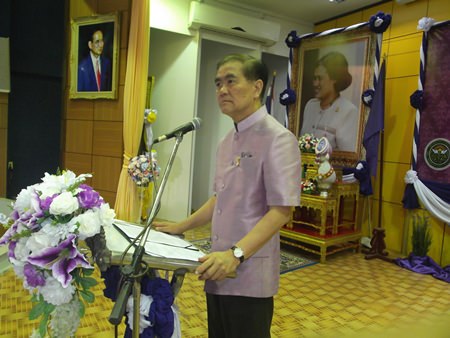Public Health Minister Rajata Rajatanavin said all Thai leg amputees will receive prosthetic limbs by 2016.
Speaking in Chonburi for the opening of a one-stop service center for the disabled, the minister said the Sirindhorn National Medical Rehabilitation Center currently provides services to the disabled in Chonburi, Nakhon Si Thammarat, Mae Hong Son, and Pichit.
The services include disabled registration, making artificial legs, and repairing prosthesis for the disabled. It aims to make artificial legs for 600 disabled people with 10 million baht funding within the completion of the project at the end of May this year.
 Dr. Suphan Srithamma, director general of the Department of Medical Services.
Dr. Suphan Srithamma, director general of the Department of Medical Services.
Dr. Suphan Srithamma, director general of the Department of Medical Services, said the project is operated in Chonburi between March 24 and 30. So far it has given artificial legs to 129 people, along with 24 canes, 23 wheelchairs, and 2 tricycles. It also provided training to 100 people and provided disabled registration for new applicants, as well as previous ones who lost their disabled identification cards.
Rajata said the Ministry of Public Health has accelerated the development of the services system for the disabled to cover every area.
The latest report from the National Statistical Office shows that in 2012, Thailand had more than 1.5 million disabled people, 80 percent of whom live in rural areas. About 1.4 million people have registered, almost 50 percent of whom are mobility disabled and elderly.
There are about 40,000 people with above-ankle leg amputation. This number tends to increase by about 3,500 people a year from accidents and chronic diseases, especially diabetes.
This year the ministry has a policy to assign family doctors and volunteers to provide services to the disabled in every community and aims for every disabled person to register and receive their benefits for education, vocational training, and public health.
The ministry aims to provide artificial legs to all of the disabled who have not yet received them, about 100,000 people altogether, by 2016 and will deploy 187 more prosthetics specialists to cope with the task.




